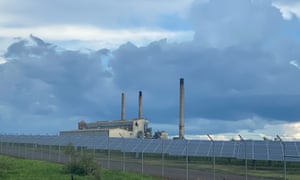The parties will vote in the Senate against controversial grant to Shine Energy, but are likely to be outnumbered
Labor and the Greens will both vote in the Senate to disallow a $3.3m grant to Shine Energy to conduct a feasibility study into a new coal-fired power station in north Queensland.
The grant to study the proposed Collinsville plant was promised by the Coalition before the 2019 election. It became controversial after Guardian Australia revealed it was awarded on an ad hoc basis, rather than via a competitive process, despite the project having been rejected by a separate electricity underwriting program.
On Friday, the federal energy and emissions reduction minister, Angus Taylor, revealed he would table the instrument granting the funding in parliament next week, framing the exercise as a test for Labor to “show they support jobs and lower power prices in regional Australia”.
The Greens told Guardian Australia they would move to disallow it. Labor’s climate spokesman, Mark Butler, denounced the project as a waste of taxpayer money, in a sign Labor would support a disallowance.
The Coalition and One Nation, however, have enough Senate votes to block the move, meaning that barring unexpected absences a vote will likely be more symbolic than a major threat to the $3.3m study.
Labor has spent much of the week publicly debating the future of fossil fuels, with senior leftwing figures Penny Wong and Tanya Plibersek rebuking shadow agriculture minister Joel Fitzgibbon for speculating the party could split if it does not do more for its blue-collar constituency.
But despite differences over the future of emissions reduction policy and the role of gas, Fitzgibbon has acknowledged Australia “won’t have a new coal-fired generator because the market will never build one”.
Butler said Labor doesn’t support “any taxpayer funds for new coal-fired power stations”.
“Neither does the Queensland LNP,” he told Guardian Australia.
“One thing the Queensland Labor government and the Queensland opposition can agree on is this taxpayer-funded project doesn’t stack up. New coal power stations mean higher power prices, the industry has called them ‘uninvestable’, and only the anti-renewables Morrison government is willing to spend money on projects like this.”
Butler said Taylor “needs to spend less time wasting taxpayer money on new coal projects that will not deliver cheap power”.
He called on the government to “accept Labor’s call for a bipartisan energy policy” and help deliver “real jobs and cheaper power to Queensland and the rest of the country”, through certainty that will deliver renewables.
The Greens leader, Adam Bandt, said Labor and the crossbench could combine to “stop $3.3 million of public money being spent on coal and potentially block this climate destroying coal-fired power station from going ahead”.
“I can save everyone the money on this feasibility study: we already know that it’s not feasible to open up new coal, oil and gas projects.
“Our climate is in crisis, and we simply can’t afford to open up new fossil fuel projects that will put our health, environment, and agricultural industry at risk.”
Shine was invited to apply for the grant two days after the government announced it would be the recipient on 8 February.
The Department of Industry, Science, Energy and Resources has insisted the process of drawing up “specific grant guidelines” for a one-off grant is “normal practice” but Labor has referred the grant to the auditor general.
The Queensland Greens senator, Larissa Waters, said the Shine Energy grant “needs a light shone on it” because it was awarded by “criteria drafted after the fact to justify an already chosen winner”.
“Shine Energy has no relevant experience and couldn’t get funding from existing programs, so the government created a new slush fund,” she said.
The Australian Conservation Foundation has criticised the project in an August briefing paper, stating there is “no credible evidence a new coal-fired power station is needed to supply electricity in north Queensland or that it would reduce electricity prices as alleged when the grant was announced”.
The ACF is concerned Shine Energy “has no prior energy project experience” and that “the guidelines for the funding were developed specifically for Shine Energy”.

No comments:
Post a Comment